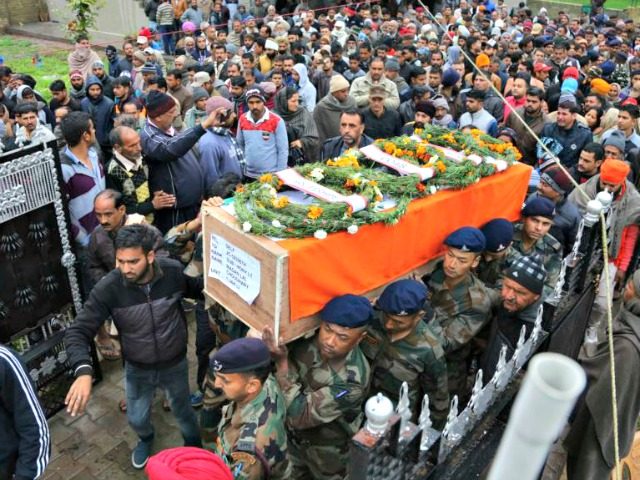The Pakistani army and terrorists from the Islamabad-allied Jaish-e-Mohammed (JeM) have intensified attacks on the portion of Kashmir controlled by New Delhi, killing ten Indian soldiers and injuring ten civilians, including women and children, in two separate incidents over a week period.
Muslim-majority Kashmir is a Himalayan region claimed by the nuclear-armed countries of Pakistan, China, and their rival India. China largely stays in the shadows of the dispute, mainly backing the position of its ally Pakistan.
The recent incidents mark the latest in a string of clashes in the disputed region that is fueling tension between India and Pakistan despite a 2003 ceasefire agreed to by the two rivals.
Last Saturday, an attack carried out by JeM terrorists “claimed the lives of five soldiers, one civilian and three militants. Women and children were among ten people wounded as the militants breached the residential quarters inside the [Indian military] camp,” reports Voice of America (VOA).
“It was the worst militant attack in months in Kashmir and threatened to fuel tensions between India and Pakistan, whose ties are already at a low point,” adds VOA.
Islamabad denies backing JeM terrorists. However, Pakistan and its ally China have been blocking United Nations efforts to designate the group’s leader and founder, Masood Azhar, as a terrorist.
During the latest deadly incident, which took place on Thursday, the Pakistani military claimed it “destroyed” an Indian army post along the Line of Control (LoC border) that separates the regions respectively controlled by the two countries in Kashmir, killing five Indian soldiers.
The Pakistani army alleged that the attack came in retaliation to Indian snipers shooting “a school van carrying children in Pakistan’s part of Kashmir, killing the driver and traumatizing students” only days after the JeM-affiliated assault on the Indian post, reports the Associated Press (AP).
India denies any involvement in the school van attack.
Echoing the Pentagon and Afghan officials, India has long accused Pakistan of harboring and supporting jihadist organizations in Kashmir like the U.S.-designated terrorist organization JeM.
On Monday, Indian Defense Minister Nirmala Sitharaman vowed that “Pakistan will pay for this misadventure,” notes VOA.
“Intelligence inputs indicate that these [JeM] terrorists were being controlled by their handlers [Pakistan] from across the border,” the minister noted, referring to the LoC in Kashmir.
“Pakistan is expanding the arc of terror … resorting to ceasefire violations to assist infiltration,” also said Sitharaman.
Pakistani Army spokesman Maj. Gen. Asif Ghafoor vowed that Islamabad will always respond to “Indian terrorism against innocent citizens,” noting that the Indian border was “destroyed” late Thursday after sniper fire earlier in the day allegedly hit a school van driving in Pakistan’s part of Kashmir, reveals AP.
Many of the attacks against Indian troops stemming from Pakistan-occupied Kashmir are carried out by Islamabad-linked terrorist groups.
“New Delhi has long accused Pakistan of arming and training militants and helping them cross the border into Indian Kashmir to conduct strikes against Indian targets — allegations Islamabad denies,” notes VOA.
Since Pakistan broke away from India 71 years ago, the two independent nations have fought three wars, including two over the Kashmir region.
The current state of hostility between Indian and Pakistan in Kashmir began to intensify following the Indian military’s killing of Burhan Wani, commander of the Kashmir-based terrorist group Hizb-ul-Mujahideen, in July 2016.
That prompted India to accuse Pakistan of helping militants carry out an attack on Indian-held Kashmir that killed at least 18 Indian soldiers in September 2016
India responded by targeting Pakistan-controlled Kashmir with “surgical strikes,” reportedly killing 38 people in New Delhi identified as terrorists.
Security conditions have since deteriorated, allowing to the likes of al-Qaeda and the Islamic State (ISIS/ISIL) to expand their presence in the region.
The recent clashes come as the U.S. intelligence community predicted that hostilities between the three nuclear-armed countries that claimed Kashmir as their own — China, Pakistan, and India — could intensify further.
“Relations between India and Pakistan are likely to remain tense, with continued violence on the Line of Control [in Kashmir] and the risk of escalation if there is another high-profile terrorist attack in India or an uptick in violence on the Line of Control,” notes the recently released Worldwide Threat Assessment issued by the Director of National Intelligence (DNI).
“We expect relations between India and China to remain tense and possibly to deteriorate further, despite the negotiated settlement to their three-month border standoff in August, elevating the risk of unintentional escalation,” it adds.

COMMENTS
Please let us know if you're having issues with commenting.